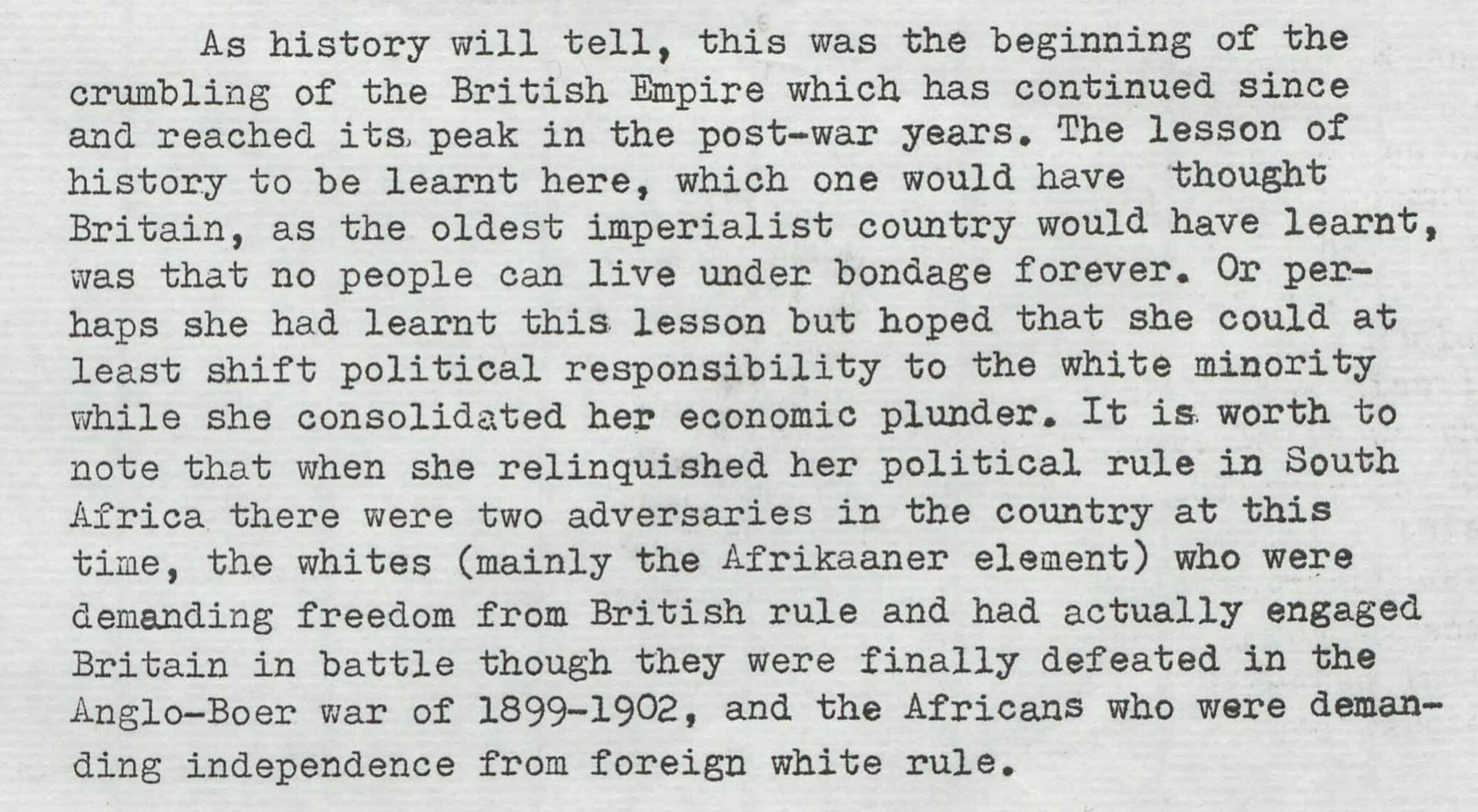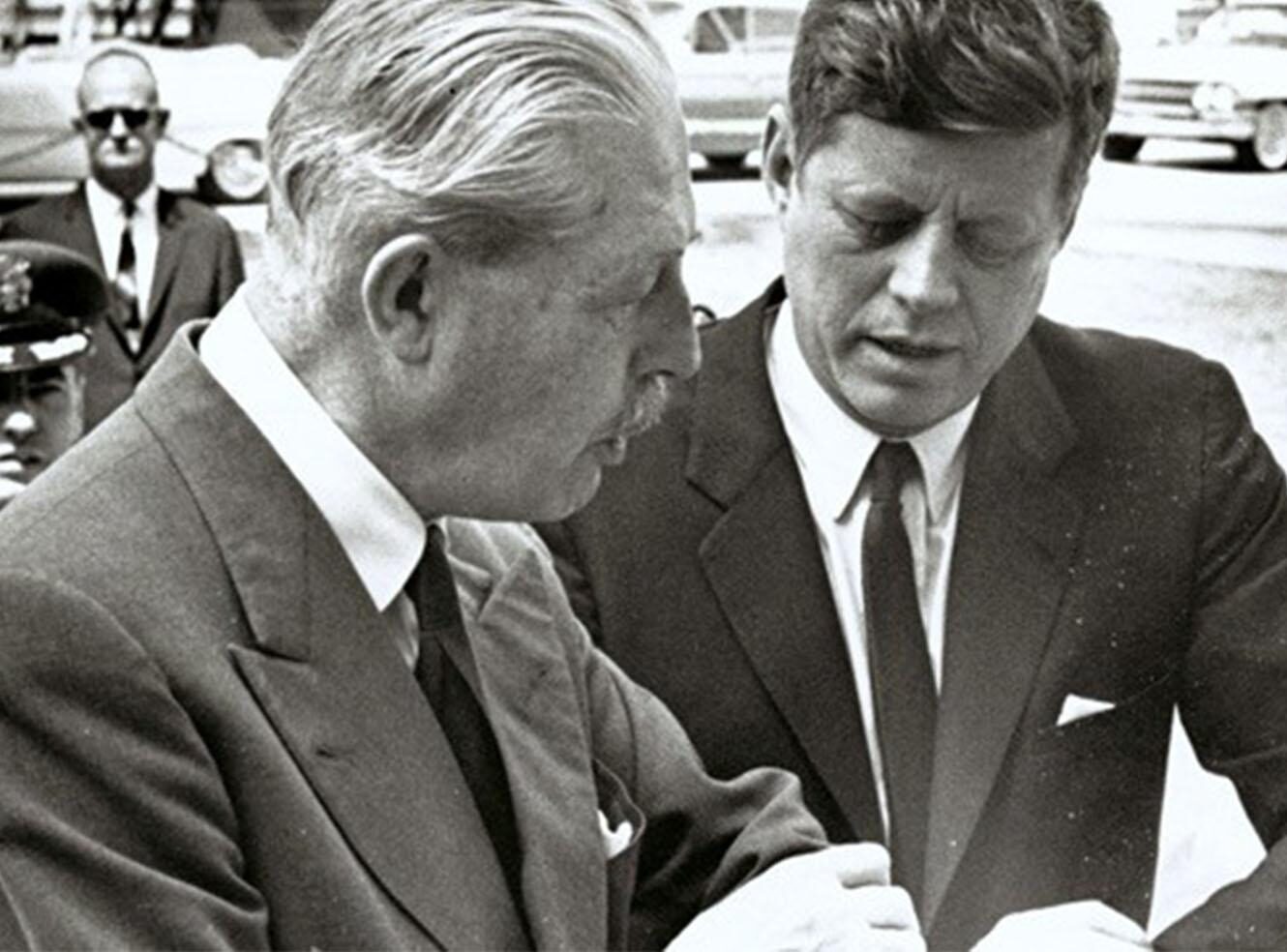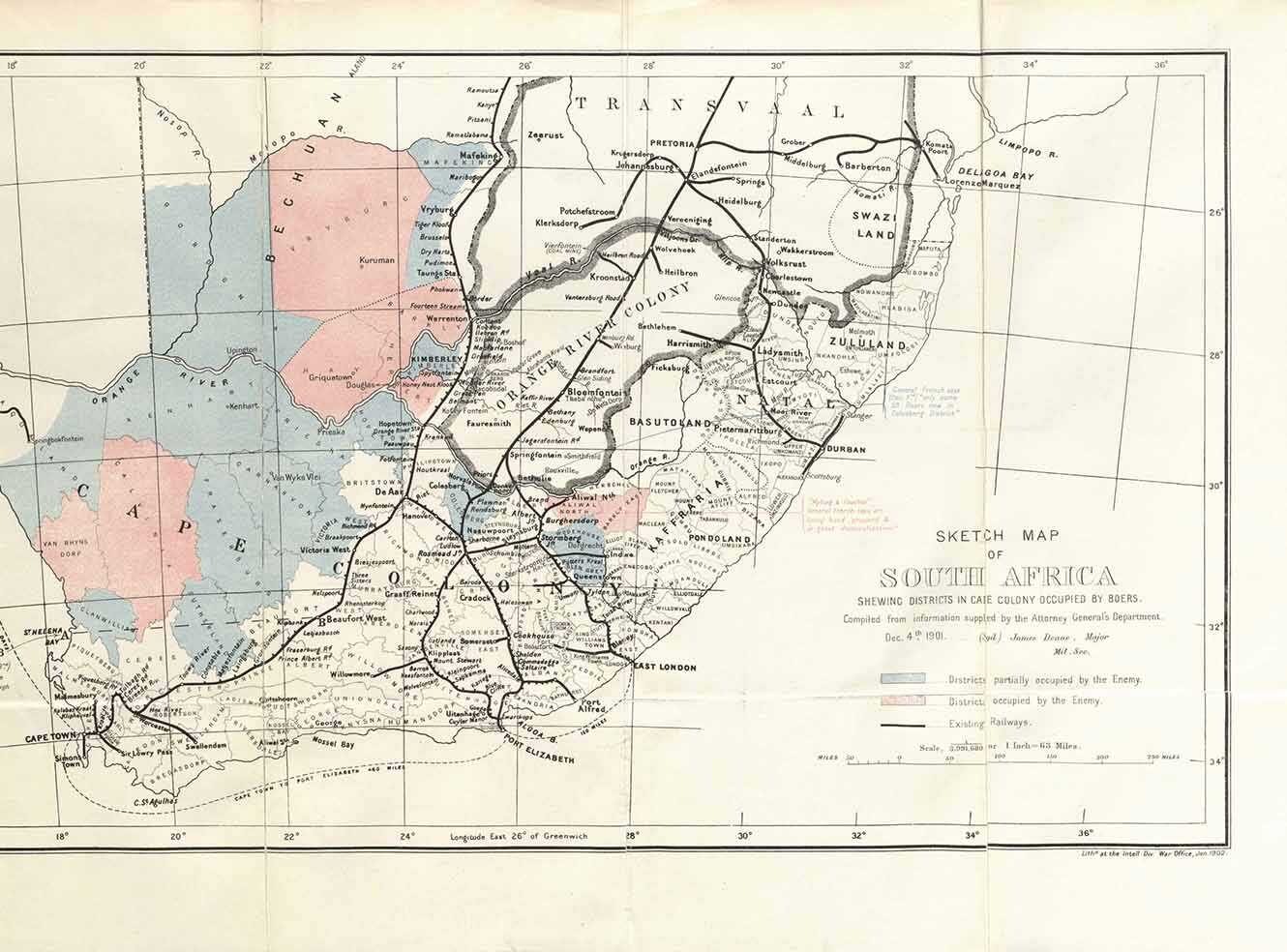Apartheid South Africa, 1948-1994
Sources from The National Archives, UK
Uncover the history of one of the twentieth century's most contentious and reviled systems of government.
This is an essential resource for the study of the apartheid era in Southern Africa, sourced exclusively from The National Archives, UK. It provides unparalleled analysis of South African politics, trade relations, international opinion and humanitarian dilemmas against a backdrop of waning colonialism and mounting world condemnation.
The content spans 40 years, from the election of the National Party in 1948 through to 1994; a period in which South Africa faced increasing international resistance, boycotts, internal strikes and violent demonstrations.
Previously restricted letters, diplomatic dispatches, reports, trial papers, activist biographies and first-hand accounts allow students and researchers to explore in detail the changing relationship of the South African government with its own people and with the wider international community.
Apartheid South Africa, 1948-1994 is part of Archives Direct, a cross-searchable multi-product platform, sourced from The National Archives, UK.
Highlights
- Embargos against South Africa
- Expulsion of South Africa from the United Nations
- Supply of arms and military equipment from Britain
- Visit of Dr Henry Kissinger, US Secretary of State, to Southern African countries
- Discussions over the nuclear situation in South Africa
- Repercussions of apartheid on sport, including the Olympic Games
- Visit of British Prime Minister Harold Macmillan and his ‘Winds of Change’ speech
- Reactions of neighbouring African nations to apartheid
- Angola and the South African Border Wars
- Black Sash Movement and Communist Party activities
- Biographies and discussions on ‘90-Day Detainees
- Treason and Rivonia Trial papers
- Black Consciousness and the Soweto riots
- Enquiry into the death of Steve Biko
- Prison conditions on Robben Island
- Educational reforms such as the mandatory use of Afrikaans
- Forced removals from Sophiatown to Soweto and of over 60,000 inhabitants from District Six
- P W Botha's limited 'Tricameral Constitution' reforms and the 'Rubicon Speech' of 1985
- The formation in 1983 of the United Democratic Front (UDF)
- The securitisation of the state and the creation of the National Security Management System
Modules include
| Module | Summary | Date |
|---|---|---|
| Section I: 1948-1966 |
The end of the Second World War presented a significant crossroads in South African politics with the formal introduction of apartheid. Witness the events that followed through British government documents sourced from The National Archives, UK. |
1948-1966 |
| Section II: 1967-1975 |
Documents charting continued progress towards the attempted implementation of grand apartheid. |
1967-1975 |
| Section III: 1976-1980 |
Chart the acceleration both in the scope of the South African government’s efforts to maintain the apartheid project and in popular resistance by Black South Africans to their continued political and economic marginalisation. |
1976-1980 |
| Section IV: 1981-1988, Resistance, Sanctions and Reform |
Witness the latter years of the apartheid regime in South Africa through the lens of British government files from The National Archives, UK. |
1981-1988 |
| Section V: 1989-1994, Negotiation, Liberation and Democracy (New for 2025) |
Explore the final years of South Africa’s apartheid regime with recently released material drawn exclusively from the British government archive at The National Archives, UK. The content allows users to research official interactions and records on a range of topics, from the release of Nelson Mandela, to the unbanning of the ANC, the reincorporation of the bantustans/homelands into South Africa and the first free elections. |
1989-1994 |
Key data
Period covered
Source archive
- The National Archives, UK
- The development of apartheid
- International relations
- Internal unrest
- Forced removals
- Bantustans and Black 'self-government'
- The growth of anti-apartheid organisations
- British diplomatic dispatches between London and Pretoria and between London and British posts across Africa
- Biographies of prominent political figures, activists, detainees and victims of apartheid
- Cuttings, transcriptions and translations of press reports, including many from Afrikaans newspapers
- Reports detailing visits to South Africa from UK and US politicians and vice versa
- Letters and telegrams from government departments and officials and from private individuals
- Minutes of ministerial meetings
- Annual reports detailing events in South Africa and neighbouring countries during the previous year
- Political, economic and military analyses
- Statistical tables
- Police and embassy investigation reports
- Published booklets, leaflets, propaganda etc.
- Maps, including regional and tribal authority areas, mineral-production areas (including gold) and Bantustans
- Heidi Brooks, Wits School of Governance, University of the Witwatersrand
- Colin Bundy, former director and Principal of SOAS and Principal of Green Templeton College, Oxford
- Giovanni Colavizza, Odoma LLC and the University of Bologna
- Daniel Feather, Liverpool John Moores University
- Matt Graham, University of Dundee
- Peter Limb, Michigan State University
- Arianna Lissoni, History Workshop, University of the Witwatersrand
- Tshepo Moloi, University of Cape Town
- Lungisile Ntsebeza, University of Cape Town
- Thulasizwe Simpson, University of Pretoria
- African Studies
- Ethnic and Indigenous Studies
- Political History and Science
- The development of apartheid
- International relations
- Internal unrest
- Forced removals
- Bantustans and Black 'self-government'
- The growth of anti-apartheid organisations
Collection insights
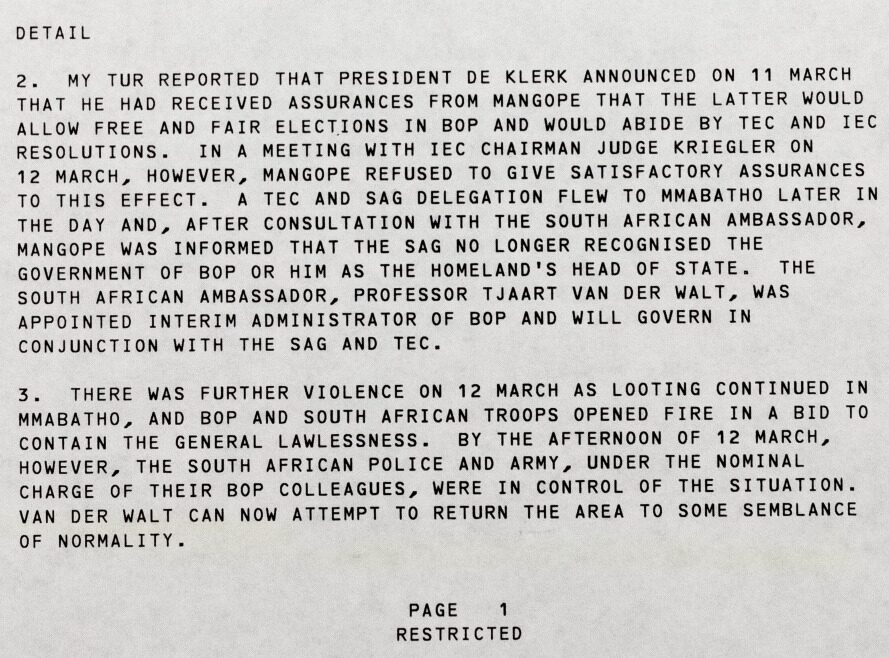
Through British government papers, Apartheid South Africa, 1989-1994: Negotiation, Liberation and Democracy explores the dismantling of apartheid and the lead-up to free elections. Nick Jackson, Senior Editor at AM, looks at an example from this wealth of content, a Prime Minister’s Office (PREM) file about resistance to participation in the elections from the political leader of Bophuthatswana.
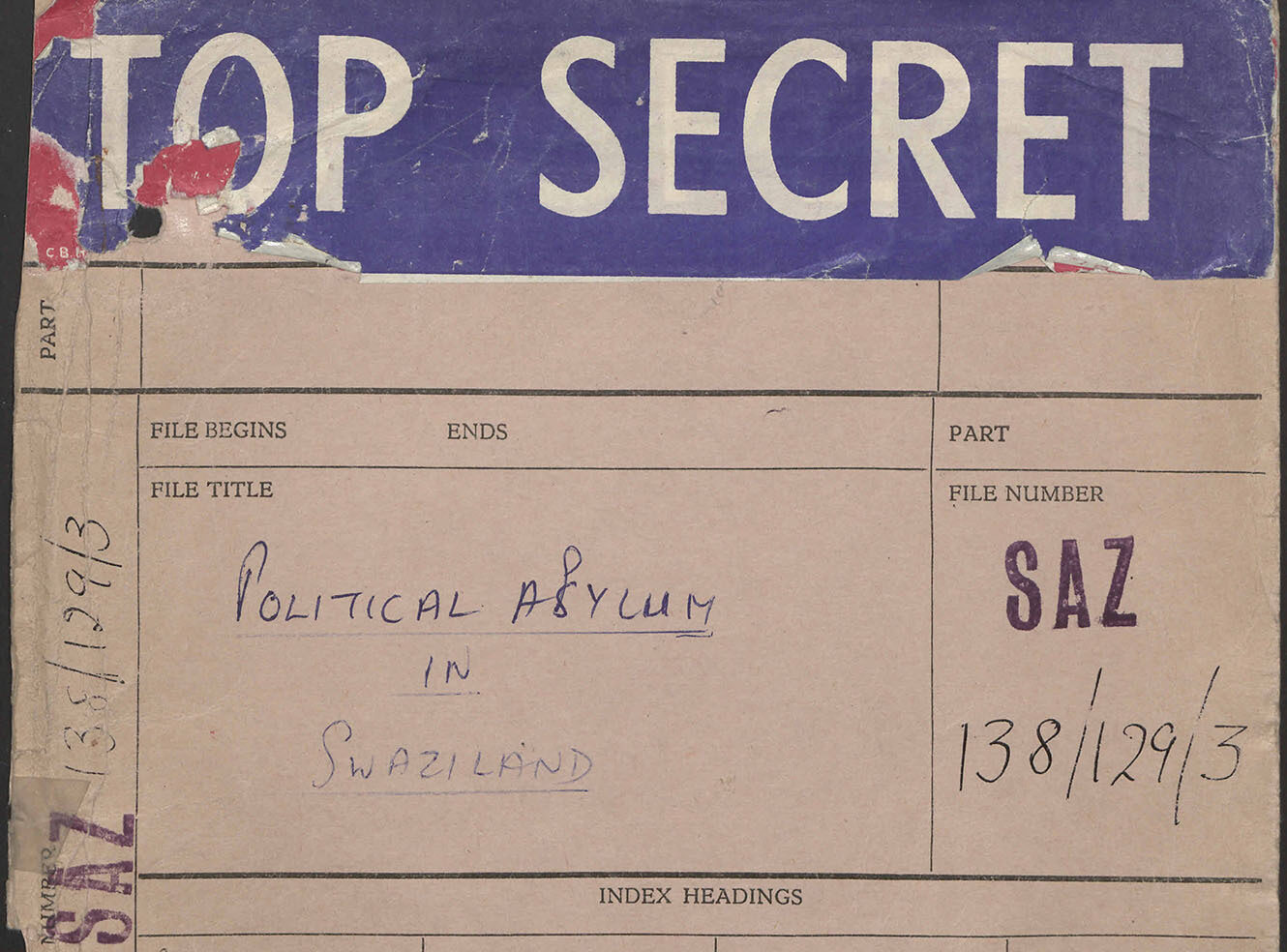
AM Archives Direct provides crucial insight into modern geopolitics from the perspective of the British state with material drawn exclusively from The National Archives, UK. Explore the teaching and research value of these documents with Dr. Matt Graham, University of Dundee alongside Nick Jackson and Alex Barr, both from AM's Editorial Production team.
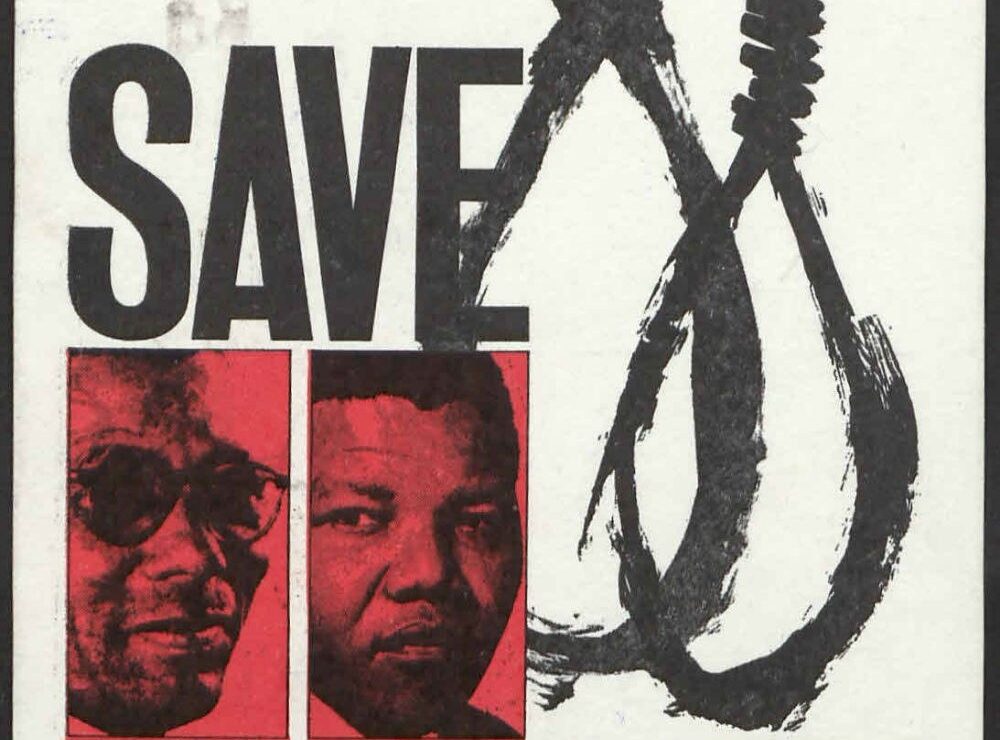
At the height of the apartheid era, in 1964, ten leaders of the African National Congress (ANC) stood accused of a number of charges, including acts of sabotage, which was, in extreme cases, punishable by death. In what was known as the Rivonia Trial, one of the accused was a man called Nelson Mandela.
Reviews
Extraordinary collection available to students and scholars studying African history, apartheid, international relations, and global politics
- Author: Cheryl LaGuardia
- Publisher: Library Journal

